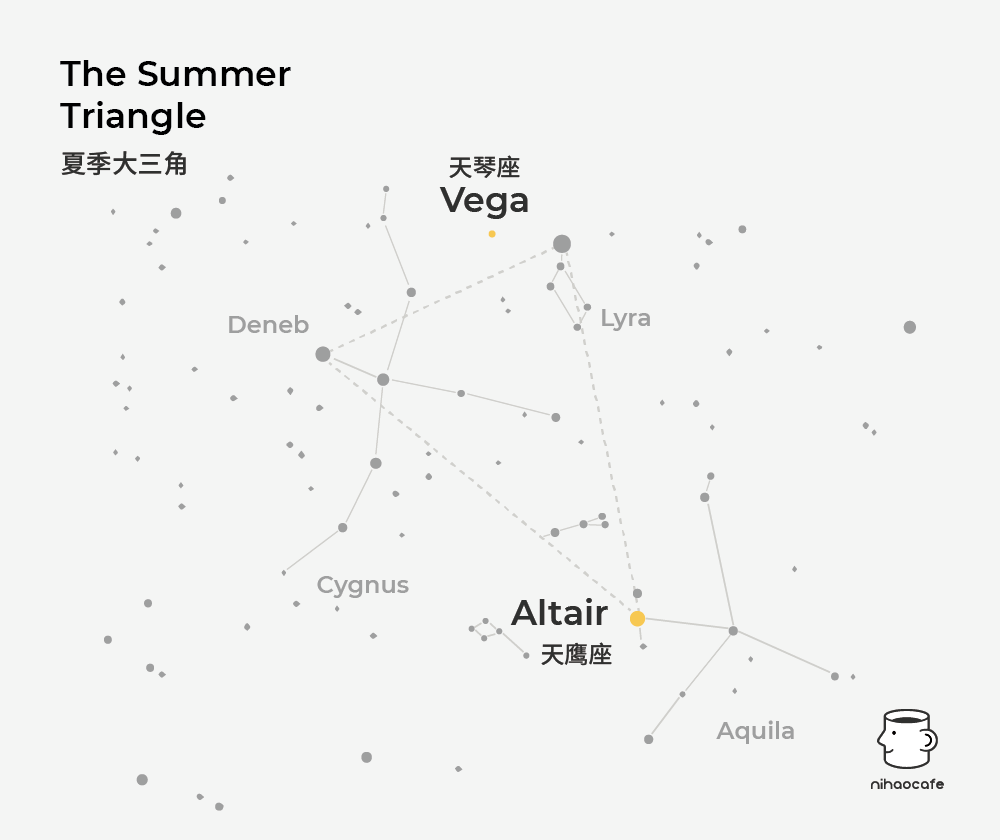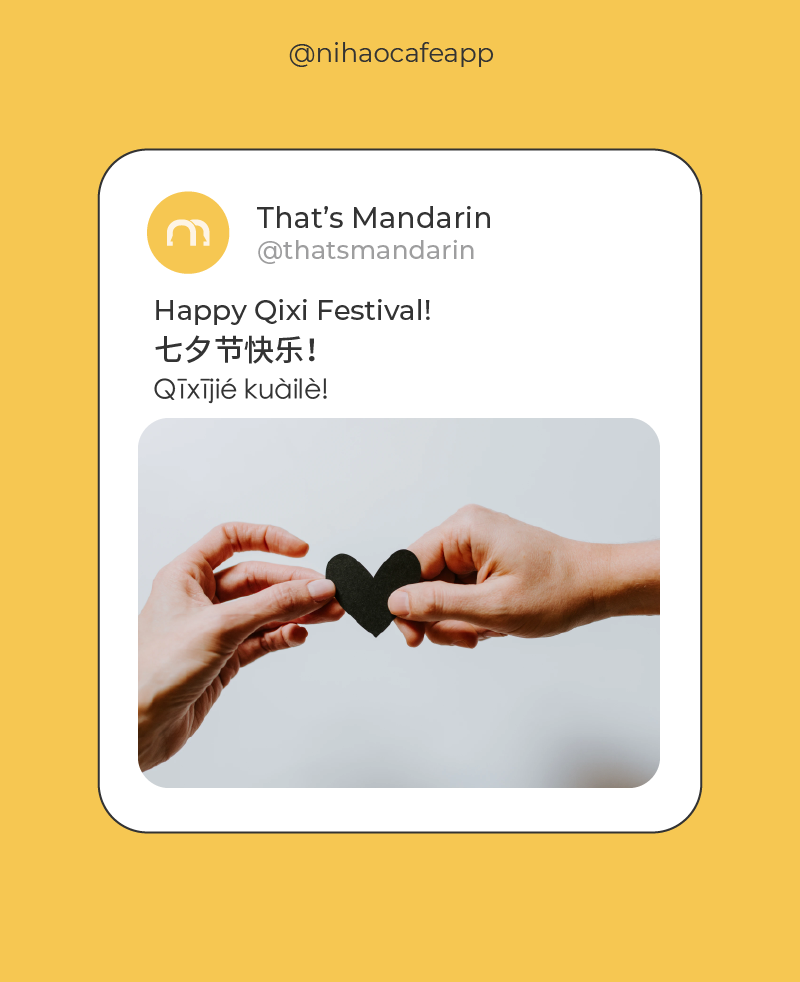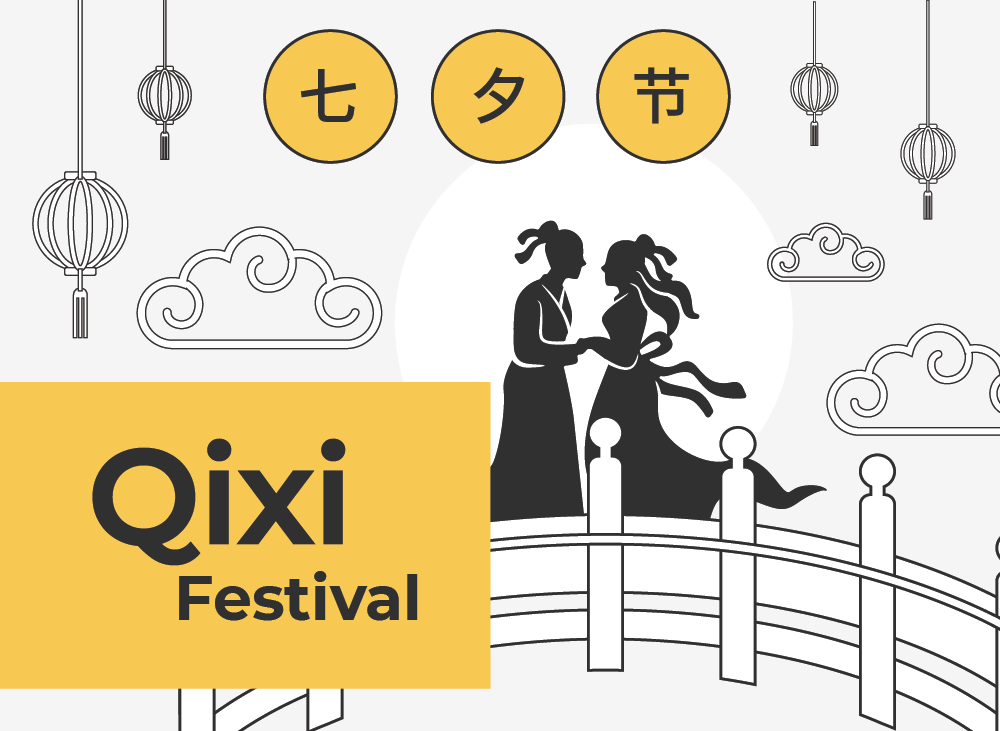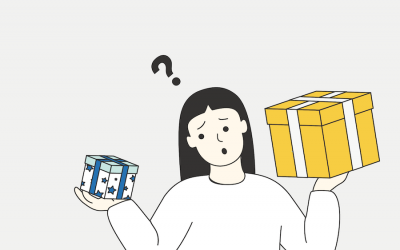Its Chinese name is 七夕节 (Qīxī Jié), or Double Seven Festival, and this week we look at the story behind it and share some insights on why it’s been so popular in China.
When Is Qixi Festival Celebrated?
August 22, Tuesday
七夕 Qixi Festival 2023
Qixi Festival is celebrated on the 7th day of the 7th month of the Lunar calendar.
In 2023, it falls on August 22, Tuesday.
Origins: Qiqiao Festival
In the beginning, this festival served quite a different purpose: it was the day when girls showcased their needlework skills. They also prayed to Goddess Zhinu for ingenuity, that’s why the original name of this festival was 乞巧节 (Qǐqiǎo Jié), literally, “ingenuity-begging-festival”.
OTHER NAMES
女儿节 (Nǚ’ér Jié), “Ladies / Daughters’ Day”
七姐节 (Qī Jiě Jié), “Seven Sisters Day” (because it was believed that Zhinu was the 7th sister)
Love Story: Weaver Girl & Cowherd
The two protagonists in the story behind Qixi Festival are 织女 (Zhīnǚ), the Weaver Girl, and 牛郎 (Niúláng), the Cowherd.
Separated in the night sky by the Milky Way, the two lovers are allowed to meet only once a year across a bridge of magpies on the evening of the Qixi Festival.
Once upon a time, there was a fairy called 织女 (Zhīnǚ), or literally, “weaving-girl”. She was the granddaughter of the powerful Jade Emperor in Heaven.
One day, she went down to Earth with her friends. There she met a boy called 牛郎 (Niúláng), literally “cowherd-boy”. They instantly fell in love with each other. Zhīnǚ decided to stay on Earth and got married to Niúláng without her grandparent’s permission. They lived together for several years and gave birth to two kids.
However, her grandparents finally discovered and got very angry, because it was unacceptable for a fairy to get married to a human. So the Jade Emperor caught her in their house and brought her back to Heaven.
To stop Zhīnǚ from going out again, he created the Milky Way to separate the lovers. The lovers could no longer see each other. Zhīnǚ would only cry on the other side of the Milky Way.
The sound of her crying was felt by the whole world. On the 7th day of the 7th month, thousands of magpies gathered together and used their bodies to build a bridge to the Milky Way. Then Niúláng and Zhīnǚ could meet on the bridge! From then on, this day became the only time of the year when they could be with each other again.
Qixi Festival: Why Is It Popular?
Why do Chinese people love this legend so much? This is probably because in ancient China, a young couple’s marriage was always decided by their parents and it was according to what class the family was in the society. The young couples never had a chance to find their lovers by themselves. Many of them hadn’t even met the person who they got married to before the wedding day. Therefore, people dreamed to experience true love like Niúláng and Zhīnǚ, even if for only one day in a whole year 💕
Qixi Festival Facts
Did you know that this story originated, literally, in the sky?
Ancient people observed the stars and noticed that two very bright stars (Altair & Vega, part of the famous Summer Triangle), are on the two opposite sides of the Milky Way. On the 7th day of the 7th lunar month, these stars get very close to each other, so people worshipped their ‘reunion’.

✨ Niúláng’s star: Altair | 天鹰座 (Tiānyīngzuò)
It’s sometimes called 牵牛星 (Qiānniú Xīng), or “Cowherd Star”;
✨ Zhīnǚ’s star: Vega | 天琴座 (Tiānqínzuò), in the constellation Lyra
It’s sometimes called 织女星 (Zhīnǚ Xīng), or “Weaver Girl Star”.
💬 NihaoCafe Teachers Say
Would you like to know what our teachers would say if you had a Chinese class with NihaoCafe about Qixi Festival? They have a lot to add! Try reading it in the original to practice your Chinese. We’ve attached pinyin for convenience.
🌌 How come the ancient Chinese named the stars after Niulang and Zhinü?
古人发现天上有两颗非常亮的星星被银河分开。
Gǔrén fāxiàn tiānshàng yǒu liǎng kē fēicháng liàng de xīngxīng bèi Yínhé fēnkāi.
Ancient people found that there were two very bright stars in the sky, separated by the Milky Way.
一个像两只角三只足的牛,一个像织布的机器。
Yīgè xiàng liǎng zhī jiǎo sān zhī zú de niú, yīgè xiàng zhī bù de jīqì.
One was like a cow with two horns and three feet, and the other was like a loom (machine for weaving cloth).
联系当时的中国社会情况是男耕女织(男的种田,女的织布,自给自足—自己生产自己的生活用品)就把他们命名为牵牛星和织女星。
Liánxì dāngshí de Zhōngguó shèhuì qíngkuàng shì nán gēng nǚ zhī (nán de zhòngtián, nǚ de zhī bù, zìjǐ zìzú—zìjǐ shēngchǎn zì jǐ de shēnghuó yòngpǐn) jiù bǎ tāmen mìngmíng wèi qiān niú xīng hé zhīnǚxīng.
In the society at that time, “men ploughed and women weaved” (men did farm work, and women did the weaving – so families were self-sufficient, producing their own daily supplies), so they named them Altair and Vega.
🌌 What do the names Niulang and Zhinü mean?
牛郎的意思是放牛的年轻小哥哥,织女的意思是擅长织布的漂亮女孩儿。
Niúláng de yìsi shì fàng niú de niánqīng xiǎo gēge, zhīnǚ de yìsi shì shàncháng zhī bù de piàoliang nǚháir.
Niulang means “cowherd”, a young man who herds cattle. Zhinu means “weaver girl”, a beautiful girl who is good at weaving.
🌌 Can you tell us more about the legend of Niulang and Zhinü?
Chuánshuō zài Yínhé de dōngbian zhùzhe yī wèi jiào Zhīnǚ de xiānnǚ.
Legend has it there was a fairy called Zhinü living on the East side of the Galaxy.
她很擅长织布,每天都努力工作,连打扮自己的时间都没有(听起来像996)。
Tā hěn shàncháng zhī bù, měitiān dū zài nǔlì gōngzuò, lián zhuāngbàn zìjǐ de shíjiān dōu méiyǒu (tīngqǐlái xiàng 996).
She was very good at weaving, worked hard every day, and didn’t even have time to dress up (which sounds like 9-9-6*).
*9-9-6 is modern slang referring to working from 9am to 9pm, 6 days a week.
银河的东边住着一个放牛的天神叫牛郎,他每天都在田里耕种,非常辛苦。
Yínhé de dōngbiān zhùzhe yī gè fàng niú de tiānshén jiào Niúláng, tā měitiān dōu zài tián lǐ gēngzhòng, fēicháng xīnkǔ.
To the east of the Milky Way lived a cowherd god called Niulang. He farmed the fields every day, and his life was very hard too.
天帝觉得这两个人独自生活很可怜,就允许他们俩结婚。
Tiāndì juéde zhè liǎng gè rén dúzì shēnghuó hěn kělián, jiù yǔnxǔ tāmen liǎ jiéhūn.
The Emperor of Heaven felt sorry for these two living alone, so he allowed them to get married.
但是自从他们两结婚以后,两个人都不工作了。天帝很生气,就用银河把他们分开。
Dànshì zìcóng tāmen liǎng jiéhūn yǐhòu, liǎng gèrén dōu bù gōngzuò le, tiāndì hěn shēngqì, jiù yòng yínhé bǎ tāmen fēnkāi.
However, since they got married, neither of them ever worked again. The Emperor of Heaven got very angry and separated them by the Milky Way.
每年只能在入秋的第七天见一次面。见面的时候,让喜鹊搭桥,所以每年立秋的第七天,很多喜鹊的头顶会变秃。
Měinián zhǐ néng zài rùqiū de dì-qī-tiān jiàn yīcì miàn. Jiànmiàn de shíhou, ràng xǐquè dāqiáo, suǒyǐ měinián lìqiū de dì-qī-tiān, hěn duō xǐquè de tóudǐng huì biàn tū.
They could only see each other once a year on the 7th day of autumn. When they met, magpies helped them build a bridge, so on the 7th day of autumn every year, many magpies get bald.
🌌 Can you tell us more about the origins of Qixi festival?
Qīxì Jié, yòu jiào Qī Qiǎo Jié, Nǚ’ér jié, Qī Jiě Jié (chuánshuō zhīnǚ shì tiāndì de dì-qī gè nǚ’ér).
Qixi Festival is also known as Qiqiao Festival, Daughter’s day, or Seven Sister’s Day (because it is believed that the weaver girl was the 7th daughter of the Emperor of Heaven).
在这一天,没结婚的姑娘们会聚集在一起祭祀织女,乞求手艺精巧,婚姻美满。后来渐渐变成了爱情的节日。
Zài zhèyītiān, méi jiéhūn de gūniángmen huìjù zài yīqǐ jìsì zhīnǚ, qǐqiú shǒuyì qiǎo qiǎo, hūnyīn měimǎn. Hòulái jiànjiàn biànchéng le àiqíng de jiérì.
On this day, unmarried girls would gather together to bring their offerings to Weaver Girl, pray for exquisite workmanship and a happy marriage. Later, it gradually became a festival of love.
🌌 What were some of the folk traditions during Qixi Festival?
Qīxì jié de shíhou bǐjiào yǒumíng de mínsú huódòng bǎokuò:
Some of the Famous folk activities during Qixi Festival included:
- 穿针,看谁穿得快;
Chuān zhēn, kàn shéi chuān de kuài;
Threading a needle to see who’s the fastest at threading;
- 抓一只小蜘蛛,放在盒子里,看谁的小蜘蛛织的网精巧漂亮;
Zhuā yī zhǐ xiǎo zhīzhū, fàng zài hézi lǐ, kàn shéi de xiǎo zhīzhū zhī de wǎng jīngqiǎo piàoliang;
Grabbing a little spider and putting it in a box to see whose spider’s web is the most exquisite and beautiful;
- 把针放在水面上,看谁放得多;
Bǎ zhēn fàng zài shuǐmiàn shàng, kàn shéi fàng de duō;
Putting needles on the surface of the water to see who can put more;
- 把种子泡在水里(小麦,绿豆等),等种子发芽,用红蓝亮色的绳子扎成一束,乞求能生一个宝宝;
Bǎ zhǒngzi pào zài shuǐ lǐ (xiǎomài, lǜdòu děng), děng zhǒngzǐ fāyá, yòng hóng lán liàngsè de shéngzi zhā chéngyī shù, qǐqiú néng shēng yī gè bǎobǎo;
Soaking seeds in the water (wheat, mung beans, etc.), waiting for the seeds to germinate, and tying them into a bundle with red and blue bright ropes, praying for a baby this way;
- 收集这一天的露水或者雨水洗澡或者洗脸洗头发(仙女姐姐洗澡用的水一定能让自己变得更美);
Shōují zhè yītiān de lùshuǐ huòzhě yǔshuǐ xǐzǎo huòzhě xǐliǎn xǐ tóufa (xiānnǚ jiějie xǐzǎo yòng de shuǐ yīdìng néng ràng zìjǐ biàn de gèng měi);
Collecting the rain dew on that day to take a bath or wash your face & hair (the water that Fairy Sister used to take a bath would make one look pretty);
- 在牛角上挂花朵,给牛过生日,用凤仙花染红指甲;
Zài niújiǎo shàng guà huāduǒ, gěi niúguò shēngrì, yòng fèng xiān huā rǎn hóng zhǐjiǎ,
Hanging flowers on one’s horn to celebrate the birthday of the Ox, dying nails red with touch-me-not flowers;
- 看星星(也有祭拜的)。
Kàn xīngxing (yě yǒu jì bài de).
Looking at the stars (and some people also worshipped the stars).
Celebrating Qixi Festival Today

Qīxī Jié kuài lè!
Happy Qixi Festival! 💖




